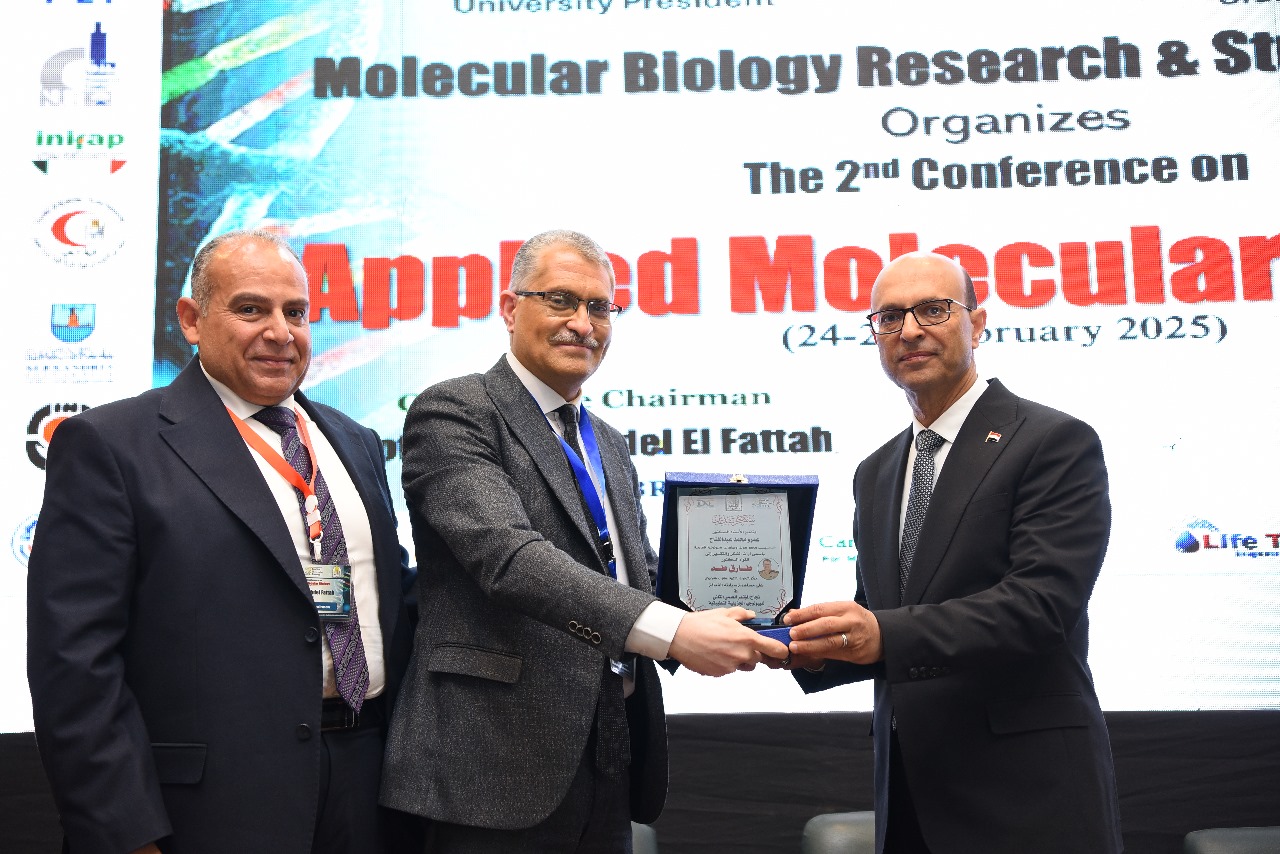President of Assiut University: The conference represents a valuable opportunity for researchers and scientists to exchange expertise for the benefit of the scientific and medical communities.
Dr. El-Minshawy: Scientific research is a fundamental pillar in achieving Egypt’s Vision 2030 in the fields of health and biotechnology.
Dr. Ahmed El-Minshawy, President of Assiut University, inaugurated on Monday, February 24, the Second Conference on Applied Molecular Biology, organized by the Institute for Molecular Biology Research and Studies at the university, under the supervision of Dr. Gamal Badr, Vice President for Postgraduate Studies and Research Affairs, Dr. Amr Abdel Fattah, Dean of the Institute and President of the conference, and Dr. Alaa El-Din Hamid, Vice President for Postgraduate Studies and Research Affairs and Conference Coordinator.
The event was attended by Dr. Ahmed Abdel-Mawla, Vice President for Education and Student Affairs; Major General Dr. Tarek Taha, Head of the Stem Cells and Regenerative Medicine Branch at the Medical Research Center; Colonel Dr. Hani Al-Nabarawi, Deputy Director of the Chemical Warfare Research Division; Dr. Asmaa Abdel-Nasser, Founding Dean of the Institute; along with a distinguished group of representatives from the Chemical Warfare Department, deans and vice deans of faculties, heads of departments, faculty members, research assistants, researchers, and students.
At the beginning of his speech, Dr. El-Minshawy emphasized the importance of holding the second Applied Molecular Biology Conference, which comes as a continuation of the pioneering scientific efforts in this vital field, which represents a fundamental pillar in the progress of modern applied molecular biological sciences, saying: "Assiut University, as one of the ancient academic institutions, pays great attention to the fields of scientific research and its advanced applications, especially in molecular biology, because of its pivotal role in developing modern medical science, immunology, molecular pathology, environmental toxicology, and providing innovative solutions in diagnostics and treatment”
The President of Assiut University pointed out that the Egyptian government, under the wise leadership of President Abdel Fattah Al-Sisi, is keen to support scientific research, recognizing its importance in achieving sustainable development and enhancing the ability to face health and environmental challenges. He explained that this conference represents a valuable opportunity to exchange experiences between researchers and scientists, and discuss the latest research findings in the field of applied molecular biology, in order to serve the scientific and medical community.
Dr. El-Minshawy extended his gratitude to the conference organizing committee and the researchers who exerted great efforts in preparation and organization, hoping that the conference will be an inspiring scientific platform that results in results and recommendations that contribute to enriching scientific research and developing practical applications in this vital field.
For his part, Dr. Gamal Badr welcomed the participating researchers, emphasizing the significant role of the Institute of Molecular Biology Research and Studies in elevating Assiut University’s international ranking. He noted the institute’s strong commitment to publishing research in international journals, resulting in the publication of 42 studies in Q1 and Q2 ranked journals. He wished all attendees a fruitful conference that would contribute to scientific progress across various fields.
Dr. Amr Abdel Fattah explained that the Second Applied Molecular Biology Conference includes unique and diverse specializations, in order to achieve the future vision of scientific research, including: Molecular microbiology and molecular immunology, molecular diagnosis of diseases of living organisms, biostatistics and bioinformatics, plant biotechnology, animal biotechnology, pharmaceutical industries, food and dairy biotechnology, environmental biotechnology, environmental toxicology and bioprocessing. He pointed to the scientific and research cooperation protocol between Assiut University and the Chemical Warfare Department, which includes many researches that serve Egypt's national security interests and scientific research.
Dr. Alaa El-Din Hamed added that the conference features the participation of 286 researchers from various Egyptian and international universities, including Assiut University, Al-Azhar University, Sohag University, New Valley University, South Valley University, Aswan University, Badr University, Helwan University, Louisiana University (USA), Sungkunkwan University (South Korea), Japan University in Alexandria, the Russian University in Badr City, Institute of Remote Sensing and Space Sciences, the Environmental and Human Toxicology Center at Florida University (USA), and the Nanotechnology Center at the British University in Cairo.
The Vice Dean for Postgraduate Studies and Research also announced that the conference includes seven keynote lectures by experts from various applied molecular biology fields, from various entities including the Center for Research, Regenerative Medicine and Stem Cells, the National Research Center, the Texas Health Sciences Center, the Scientific Research Center in Mexico, and the Universities of Alexandria and Assiut. He also announced the launch of the fourth issue of the Institute's journal indexed by the Academy of Scientific Research, which includes (29) research papers.
The conference activities included presenting the commemorative conference shield to Dr. Ahmed El-Minshawy in appreciation and gratitude for his continuous support for the Institute and his encouragement of all its scientific and research activities, in addition to honoring Major General Sami Mostafa, Director of the Chemical Warfare Department, on whose behalf the shield was received by Colonel Dr. Hani Al-Nabrawi, and honoring the researchers participating in the conference.



 Do you have any questions?
Do you have any questions? 





